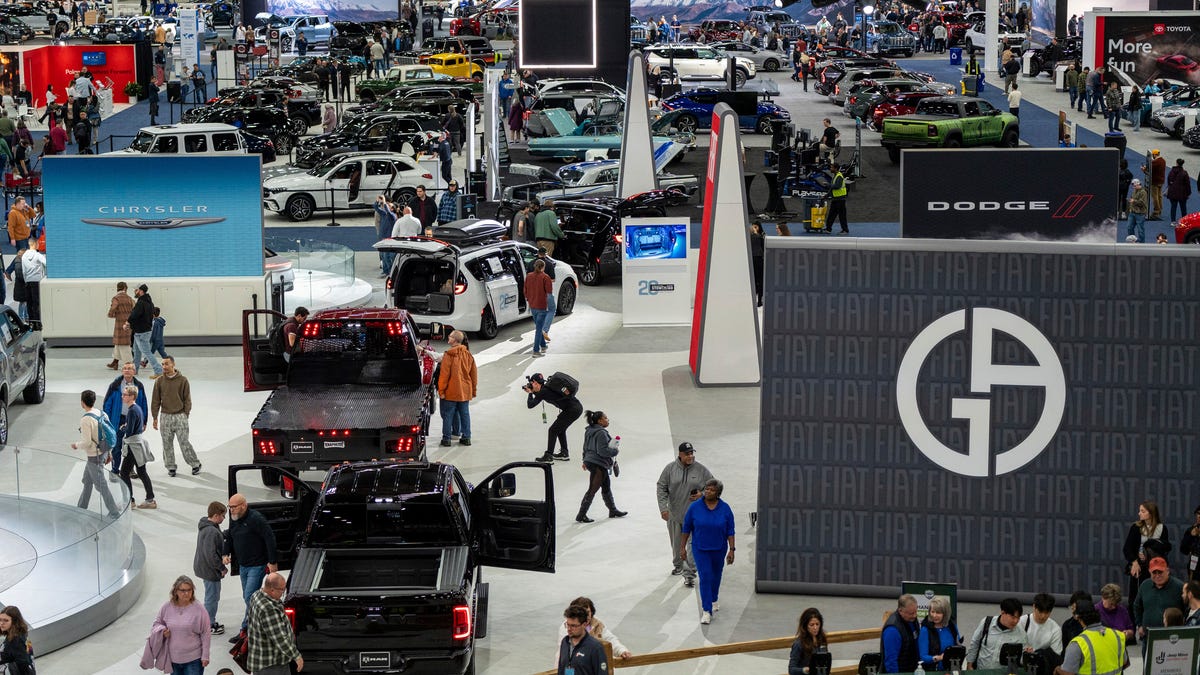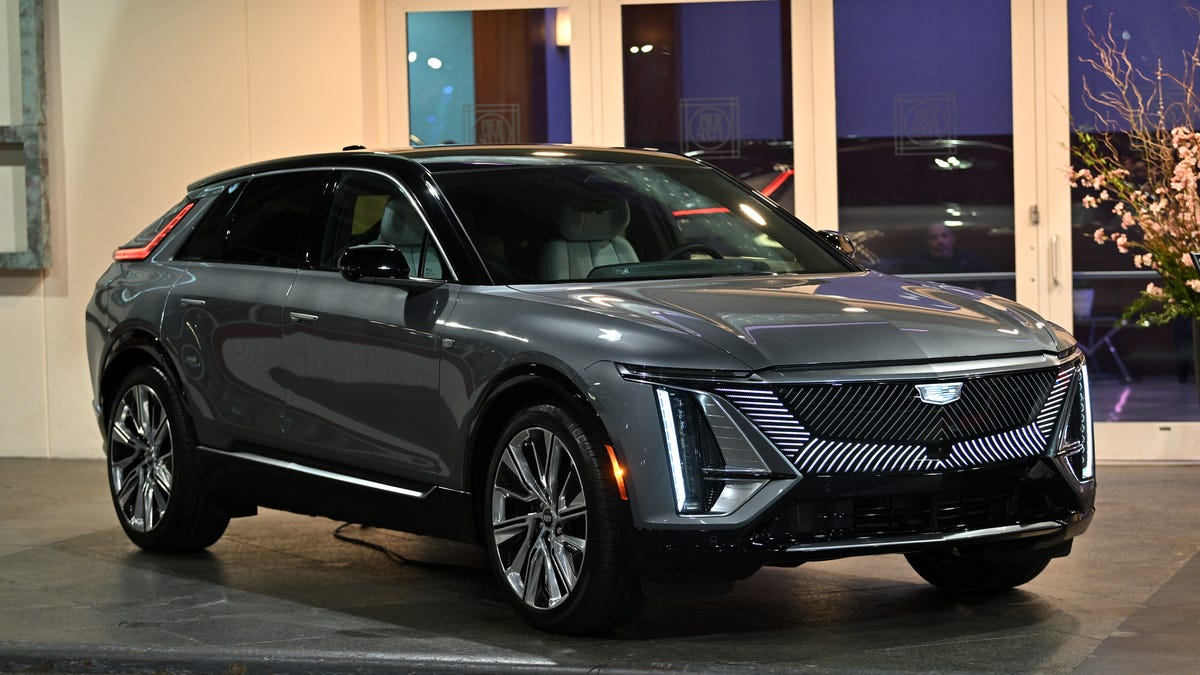
How Trump’s tariffs will effect everyday prices
With new tariffs on imports, several everyday goods are likely to become more expensive for American consumers. Cars and auto parts, many of which are produced through an integrated North American supply chain, will see price increases as manufacturers adjust to higher costs.
unbranded – Newsworthy
- The sweeping GOP tax bill calls for an above-the-line deduction of up to $10,000 in car loan interest during a given taxable year. You’d pay no tax on that interest, if you qualified.
- The proposed tax deduction aims to drive sales of U.S.-built cars and trucks, fulfilling a campaign promise made in Detroit by President Donald Trump.
If taxpayers actually end up seeing a new, proposed tax break on the interest borrowers pay on car loans, at least some can claim it all started in the Motor City.
President Donald Trump, who was running for his second term last year, dropped that car loan bombshell during his comments at the Detroit Economic Club on Oct. 10, 2024, less than a month before the presidential election. Trump said then that he planned to propose making interest on car loans fully deductible.
Now, we’re getting more of the details for what such a deduction could look like based on what was tucked into the broad tax plan released by House Republicans on May 12.
The White House calls the proposed legislation “One, big, beautiful bill.”
If you’re looking to buy one, big, beautiful SUV or truck or car, pay attention to the haggling in Washington to see whether a new deduction on car loans will become a reality.
How big or beautiful that car loan deduction would be
The good news: The GOP bill calls for an above-the-line deduction of up to $10,000 in car loan interest during a given taxable year. You’d pay no tax on that interest, if you qualified.
Creating an above-the-line deduction means that the proposed tax break on car loan interest would not just apply to the roughly 10% of taxpayers who itemize deductions. It also would apply to the vast majority of people who do not itemize and instead claim the standard deduction.
The standard deduction became far more prevalent after the major tax changes in the Tax Cuts and Jobs Act of 2017 — the Trump tax cut initiative that expires at the end of 2025. Trump is seeking to extend those tax cuts that are set to expire later this year.
The so-so news: All new car and truck buyers who take out a car loan won’t qualify for the deduction. Much will depend on your income — and the car or truck that you buy.
Take a look under the hood of this tax break
Under the plan, House Republicans are calling for making the auto loan interest deduction limited to $10,000. But the deduction would phase out by $200 for every $1,000 of modified adjusted gross income above $100,000 for single filers and $200,000 for joint filers, according to an analysis by the Tax Foundation, a nonprofit research organization.
As a result, a single person with $149,001 in income or more would not receive any deduction, according to Mark Luscombe, principal analyst for Wolters Kluwer Tax & Accounting in Riverwoods, Illinois. The deduction phases out entirely, based on his calculations, for a married couple making $249,001 or more.
The auto loan interest deduction would be temporary under the GOP plan, and it would apply to auto loans that are taken out in 2025, 2026, 2027 and 2028.
If you took out a five-year car loan in 2027, for example, you could only expect two years for a deduction on your car loan interest to apply at this point.
The wording of the bill indicates that you would only get the deduction for those specified four years, Luscombe said.
Again, the tax rule has yet to be approved, so don’t bank on that tax deduction just yet.
We’re talking about a tax break for buyers of qualified passenger vehicles that are “manufactured primarily for use on public streets, roads, and highways,” according to the House Ways and Means Committee section-by-section breakdown of the bill.
The vehicle could be a car, minivan, van, sport utility vehicle, pickup truck or even a motorcycle.
An applicable passenger vehicle for the tax break also would include all-terrain vehicles and recreational vehicles, if their final assembly took place in the United States.
The tax break would apply only to auto loans that were taken out to buy cars or trucks that have their final assembly in the United States.
It’s debatable at this point whether the tax break would apply to both new car loans, as well as used car loans. The language in a Ways and Means Committee states: “No tax on car loan interest.” It does not specify if that applies only to car loans taken out by a consumer to buy a new car. It also does not state whether a car loan for buying a used car would apply.
Luscombe said it’s not clear what the odds are yet for Congress to pass a car loan deduction or even a deduction with the same rules outlined in the Ways and Means bill.
Bills were introduced in both the House and the Senate that focused on the auto loan interest deduction. Detroit Free Press Washington correspondent Todd Spangler reported about one bill by U.S. Rep. Bill Huizenga, which is dubbed the “Made in America Motors Act.” Huizenga, R-Holland Township, introduced that legislation May 7, which would allow a deduction of up to $2,500 in a given year for interest paid on a loan to buy a motor vehicle if it was built in the United States.
The differences in various bills are likely to emerge and be debated in the coming weeks.
“Any provision is likely to be weighed in terms of its impact on the overall budget numbers in trying to make the overall bill meet the budget requirements,” Luscombe said.
Your entire car payment wouldn’t be deductible
A key point to understand: Your entire monthly car payment would not be fully deductible. If you’re paying $834 a month for your car loan, you’re not looking at a $10,000 a year deduction.
Jonathan Smoke, chief economist for Cox Automotive, said consumers need to understand that car loans are amortized so that each payment covers interest and principal. You’re not paying the same amount of interest each year on your car loan.
More of your payment goes to cover interest, Smoke said, in the first years of the loan. Therefore, the maximum tax deduction would be in year one and then it would get smaller in future years.
Let’s assume an interest rate of 9.5% on a six-year car loan. On a $42,000 car loan in this example, the borrower would pay $768 a month. The first year of interest would add up to a bit more than $3,750 in this example.
For someone at a tax rate of 24%, that deduction would reduce taxes by roughly $900. But it’s important to note that the deduction would decline in subsequent years of that car loan.
It’s also key to note the dollar value of the deduction would be bigger for someone who makes more money and pays a higher tax rate. It would be smaller for someone who earns less money and pays a lower tax rate.
Ivan Drury, director of insights at Edmunds, said interest over the life of a loan is often overlooked as consumers become focused on monthly payment.
Interest rates have hovered around 7% for the last two years, he said, and the amount financed has been at or slightly above $40,000.
As a result, consumers are paying nearly double the amount of interest that they had in previous years.
“While a tax deduction won’t wash away all of the increased costs associated with purchasing a new car in today’s age, it will certainly dull the edge,” Drury said.
If the legislation is approved by Congress, consumers would need to pay attention to the interest rate they’re paying, Drury said, especially since this deduction wouldn’t be available across the board or even on some models where different trim levels are assembled outside of the United States.
Finding and qualifying for an affordable car loan
Another obvious but essential point: You’d need to qualify for a car loan to be able to take advantage of this tax break.
Increasingly, experts warn more consumers are experiencing financial fragility, struggling to manage their money and their debt.
Many consumers now expect that it will be far tougher to find an affordable car loan and many fear rejections in obtaining credit, according to a survey related to credit access by the Federal Reserve Bank of New York.
The survey takes into account what it calls “discouraged borrowers” or those respondents who stated they did not apply for any credit in the past 12 months because they did not think they would get approved, despite reporting a need to borrow. Those discouraged borrowers reached 8.5% in the February survey, the highest level since the start of the survey in October 2013.
For auto loan applications, the survey noted, the average perceived probability of a rejection reached 33.5%, the highest level since the start of the series.
Cox Automotive’s research indicated that consumers saw credit access dip in April, particularly for those with lower credit scores. “Lenders were more cautious about extending credit to higher-risk borrowers,” according to Cox Automotive.
A variety of issues could dampen someone’s ability to buy a car this year or next — loss of a job, fear of losing a job, a credit score that was dinged in 2025 by nonpayment of student loans. Credit scores for student loan borrowers started getting hit again this year, as delinquencies resumed appearing on credit scores.
High car prices and high interest rates on car loans are another issue that can cause someone to put off buying a car or truck. Higher tariffs on many cars will drive up prices, too.
Ford Motor Co., for example, raised prices in May on the Mustang Mach-E electric SUV, Maverick pickup and Bronco Sport, which are built in Mexico. Prices increased by as much as $2,000 on some models, as first reported by Reuters.
In addition, many drivers owe more than their current car is worth, given the high prices they paid during the pandemic and used car values now, cutting into the potential trade-in value.
The expectation is that U.S. car and light truck sales will fall behind last year’s red-hot run when it comes to sales in 2025, 2026 and 2027, according to a forecast issued in May by University of Michigan economists.
Right now, U-M economists expect U.S. passenger vehicle sales to drop sharply later this year, from an annual pace of 16.4 million in the first quarter of 2025 to 14.8 million in the third quarter once the tariffs on vehicle imports drive up prices for new cars and trucks.
So, a tax break on the interest you pay each year on your car loan certainly could rev up an industry facing plenty of challenges.
Free Press Washington correspondent Todd Spangler contributed to this report.
Contact personal finance columnist Susan Tompor: stompor@freepress.com. Follow her on X @tompor.










